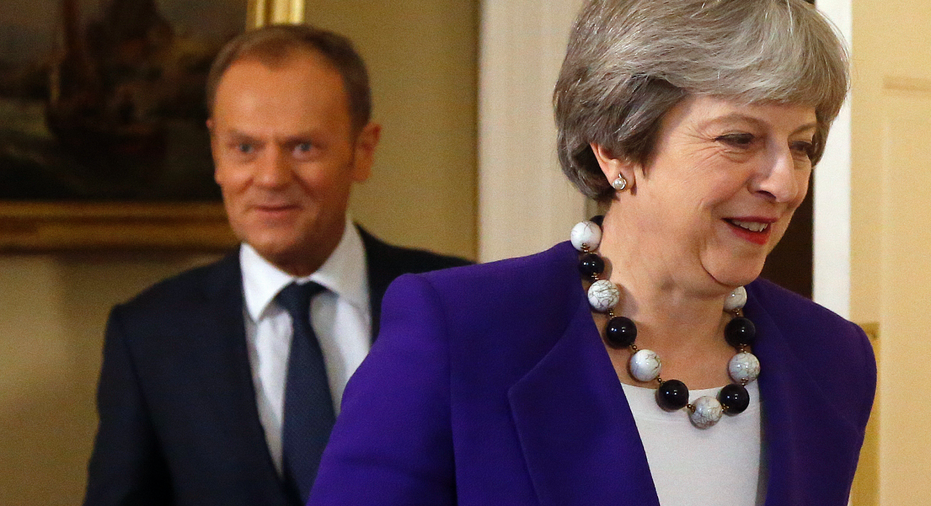May and Tusk meet as UK and EU differ on Irish border, trade

LONDON – Britain urged the European Union to be constructive and the EU told the U.K. to get realistic, as the divorcing partners differed Thursday over the Irish border and their post-Brexit economic relationship.
Conservative British Prime Minister Theresa May met European Council President Donald Tusk at 10 Downing St. in London, a day before the British leader makes a speech she said will outline "our proposals for the future economic partnership" with the EU.
May's office said Friday's speech will call for "the broadest and deepest possible agreement - covering more sectors and co-operating more fully than any free trade agreement anywhere in the world today."
May plans to say that can be achieved "because of our unique starting point, where on day one we both have the same laws and rules."
In a statement Thursday after her meeting with Tusk, May's office said she "hoped that European leaders would engage with this thinking constructively."
Downing St. characterized the meeting, over a lunch of poached lemon sole, as "positive and constructive."
But Tusk and other top EU officials have expressed increasing frustration with Britain's stance, which many in the bloc see as vague and unrealistic. Tusk said as the meeting started that he was "not happy" with May's negotiating "red lines," which include leaving the EU's single market and customs union.
The U.K. is due to leave the EU in March 2019, but the two sides have yet to negotiate new arrangements for trade, security, aviation and a host of other fields.
Chief EU negotiator Michel Barnier said Thursday that British officials should stop pretending "that the U.K. could obtain a free trade deal with the EU with all the benefits of the single market without the obligations."
"Abandoning such ideas will enable us to begin building an ambitious future partnership based on the foundation of realism," he told a business gathering in Brussels.
British aims have been left vague so far — more than 18 months after the country voted to leave the EU — because May's Conservative government is divided. Some ministers want a clean break with the EU, while others hope to retain close economic alignment with the bloc to cushion the shock of Brexit.
British ambiguity collided this week with the hard problem of the border between Northern Ireland and the Irish Republic, which will be the only land frontier between the U.K. and the EU after Brexit.
Britain and the bloc agreed in December that there would be no customs posts or other impediments along the all-but-invisible border.
The EU says Britain has not set out how that can be achieved, so it made its own proposal Wednesday — which Britain rejected. May said the plan, which would keep Northern Ireland inside the EU's customs union, would "undermine the constitutional integrity of the U.K."
Tusk said he was keen to hear whether the British government had a better solution.
Before meeting May, he said "no one has come up with anything wiser" than the option outlined in the EU's draft Brexit withdrawal text, which aims to keep people, goods, services and money flowing between the U.K.'s territory and EU member Ireland.
___
Cook reported from Brussels.



















